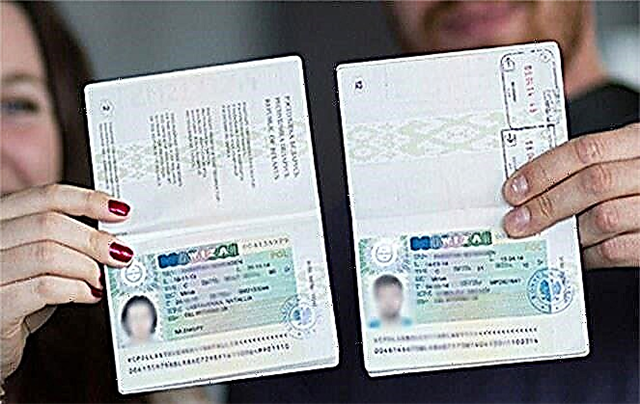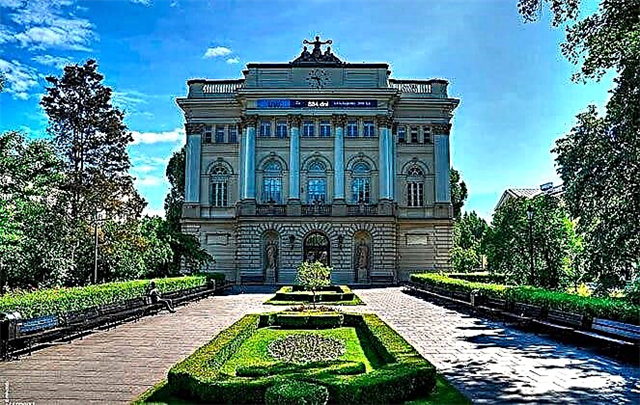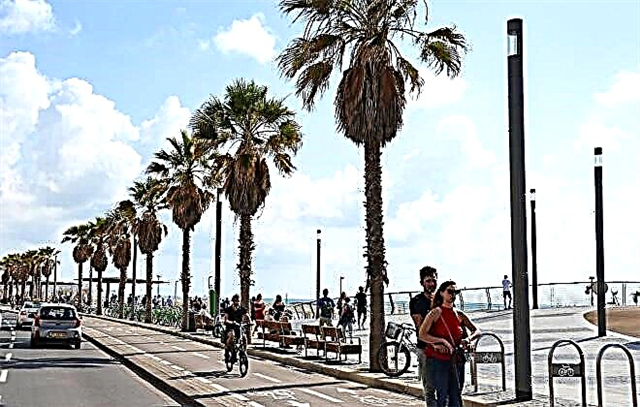Everyone who has visited Israeli soil at least once wondered what it would be like to live in this state, how life could go if this particular country turned out to be a homeland. It is especially important to find an answer for those who are going to move to permanent residence. For them, the standard of living in Israel, and the peculiarities of local life, and the best cities for life will matter.

How they live in Israel
The uniqueness of the State of Israel lies already in its history: it arose 3 thousand years ago, disappeared a thousand years later and only in the middle of the 20th century reappeared on the world map. At the same time, one of the most ancient cities - Jerusalem - and in our time continues to be a sacred land for three world religions: Christianity, Judaism and Islam.
With such an unprecedented history of existence and development, it is quite justified to wonder how the inhabitants of Israel and visitors live today.
If we evaluate the standard of living as the satisfaction of spiritual and material needs, then the Promised Land is a modern country with ancient traditions, a high level of social and legal protection of its inhabitants. Israelis' income allows them to pay for necessary goods and services within their budget. And those who cannot do this are under the tutelage of the state.
How much do Israelis earn
The average salary in the country in 2021 was 10,867 shekels ($ 2,990). But a working person gets much less, since this amount is indicated without deducting tax liabilities. Personal income tax is charged starting from 5,220 shekels ($ 1,428). It is calculated on a progressive scale and ranges from 10 to 50%.
Certain benefits apply to citizens of the country, but non-residents will have to pay at least 21% of their salary in Israel. If we add 12% to this amount for deductions for health insurance and 2.5% for the pension fund, then we can say that an employee will be able to get a little less than 2/3 of his earnings - about 6-7 thousand shekels (1 641- $ 1,916). Approximately 65-70% of the population who have a job (about 3.5 million people) live with such an income.
But even with such a salary, the standard of living in Israel is higher than in Russia, since an ordinary resident of the country can easily live on this money for a month, even taking into account the maintenance of housing. The income of doctors and teachers fluctuates in the range of 7.5-8 thousand shekels ($ 2,000-2,239). It is for this reason that many of our compatriots want to emigrate to Israel.
Civil servants receive the most - about 13,000 shekels ($ 3,638) and programmers - 16,800 shekels ($ 4,625).
Social Security
According to the World Health Organization, in 2021, the Israeli state took one of the first positions in the list of countries for the provision of medical services and the promotion of healthy lifestyles. According to this report, the average life expectancy in Israel is 82.5 years (8th place).
The top positions of the rating are occupied by Japan, Singapore, South Korea, Spain. In terms of the male population, Israel ranks 4th (80.6 years), giving way to Ireland, Switzerland and Iceland.
This high indicator was achieved thanks to the state policy aimed at:
- rendering assistance to economically vulnerable citizens;
- support for people who find themselves in a difficult life situation;
- regulation of income to ensure equality of all segments of the population (this avoids such a phenomenon as poverty).
The state also provides for the following types of benefits;
- for invalids;
- additional payments to wages;
- payments to ensure a living wage;
- protection of vulnerable segments of the population (pregnant women, single mothers with children, under 7 years of age);
- assistance to the unemployed;
- support for migrants.
Benefits and allowances for repatriates in Israel are no different from those received by residents. Moreover, repatriates are entitled to support from the very first day of immigration, from the purchase of an air ticket to the “absorption basket”. This suggests that leaving for Israel as an illegal immigrant is not only dangerous (such a status threatens with deportation), but also unprofitable.
Medicine level
Israeli medicine today is the object of close scrutiny for those in need of treatment. People come here from the CIS countries, Arab states and even from the United States. High technical equipment of clinics, professionalism of doctors and the introduction of the latest technologies ensure:
- high average age of life in Israel;
- low mortality rate during childbirth and from diseases such as cancer, heart attack, stroke, diabetes;
- a high birth rate (it is projected that in 2021 the annual natural increase in the population will be approximately 137,780 people);
- the effectiveness of the impact on many diseases with minimal surgical intervention;
- development of such an industry as medical tourism, which today is an additional channel for replenishing the state budget.

Treatment in Israel is carried out in all areas of medicine, leading among which are:
- orthopedics;
- oncology;
- reproductive medicine;
- neurosurgery.
Payers of contributions to insurance funds can use the services of hospitals free of charge. Individuals without insurance pay for each visit individually.
On average, one visit to the doctor can be quite expensive: 1,700-2,500 shekels ($ 4 64-6 83).
How much does life in Israel cost
Whether it is good for Russians to live in Israel is determined by several factors: the climate, the cost of education and rental housing, the ability to buy food at a low price. Good to know before immigrating to Israel:
- Food and property prices are as high as wages. The cost of living remains one of the highest in the Middle East.
- What may seem expensive to an ordinary resident in Russia will be considered quite affordable in Israel.
- Living in Tel Aviv is more expensive for Russians than in other cities. The amount of expenses here fluctuates not only depending on the area, but even on the street.
How much is housing
Renting an apartment is the main cost for an expatriate. Buying your own house or apartment in Israel is quite difficult because the prices are very high. Accommodation in the hostel will cost about $ 30-40 per night and this is not in high season.
You can rent a one-room apartment in Haifa for $ 500, and in Jerusalem for $ 800. In general, prices were distributed across the regions as follows:
- metropolitan area: 3,500-5,000 shekels ($ 957-1,368 / 61,072-87,246 rubles);
- central part of the country: 2,500-4,500 shekels (684-1,231 $ / 43,623-78,521 rubles);
- periphery: 2,000-3,500 shekels (547-957 $ / 9 544-61 072 rubles).
The most expensive real estate in Israel is located in Jerusalem and Tel Aviv. Buying a three-room apartment in these cities will cost about $ 650,000. In a small village, you can become a home owner for 100 thousand dollars.
Food basket
The second major cost item is products. You can only save money if you cook at home.
The life of immigrants in Israel is made easier by the fact that government policy is aimed at regulating the cost of the basic food basket, which includes salt, milk, bread, eggs, butter and sour cream, and hard cheese. Prices for other food items are dictated by the market, and therefore the price difference can reach 100% in different regions.
The estimated cost of food for one family of six people will be 2,000-2,400 shekels ($ 547-657). Information about how ordinary people live in Israel will be useful:
- it is cheaper to buy food in the Arab quarters;
- goods sold in a free economic zone (for example, in Eilat) are cheaper because they are not taxed;
- grocery stores in the country are closed on Saturdays;
- tobacco products are getting more expensive every year. Today the price for them is 33-39 shekels ($ 9-10.67). This pricing policy is one of the measures to combat smoking.
Transportation costs
Public transport in Israel is the next thing to set aside money from your salary. 1 liter of gasoline costs 8 shekels (approximately 139 rubles), while in Moscow the price for it is 45-50 rubles. You can get to Tel Aviv from Jerusalem by taxi for 400 shekels (approximately $ 112), and a bus trip will cost you 6 shekels ($ 1.68).
You can use the services of minibuses. The road from Jericho to Abu Disa will cost 12 shekels ($ 3.3). A shuttle from Ben Gurion Airport to Jerusalem will cost 64 shekels ($ 17.5).
When evaluating living in Israel in terms of transport costs, it is worth noting that railway services are the cheapest:
- Ben Gurion – Tel Aviv - 13.5 shekels (3.7 $);
- Tel Aviv-Haifa - 27.5 shekels (7.5 $).
Air transport is provided by five airlines, two of which are engaged in domestic passenger transportation. Domestic flight Tel Aviv-Eilat will cost 128-366 shekels ($ 35-100).
Traditions, mentality and attitude towards foreigners
All residents of the Israeli state, on the basis of current legislation, have equal duties and rights, regardless of nationality. Answering the question whether it is safe to live in Israel, we can say that ethnic diversity creates some difficulties. For non-Jews, it is more difficult, for example, to find a job or contact government services.

And although in everyday life the division into Orthodox Jews and other residents of the country is not strongly felt, as soon as one has to contact the authorities, the difference in favor of persons of Jewish nationality becomes tangible.
The language barrier plays a significant role in the integration process. It will be almost impossible to get a good position without knowing the state language.
Although the languages of Israel are very diverse, the emphasis should be on Hebrew and English.
The success of adaptation also depends on the knowledge of some of the features of life in the country:
- Saturday is a holiday. Almost everything is closed on this day.
- Beware of smoking in public places, especially in religious areas.
- Try to take less pictures, especially children and military objects.
- Study local laws.
- Carry water with you at all times. This is due to the peculiarities of the climate and intense heat in the summer months.
- Pay attention to how you are dressed (in particular for women: try to cover your arms and shoulders and wear skirts below the knee).
Russian diaspora
It is customary to call everyone who speaks Russian a Russian in Israel, even if it is a Jew. For this reason, when they say that the number of Russians living in this territory is 2 million people, they mean Russian speakers. Of these, 200,000 are ethnic Russians.
Whether it is worth moving to Israel for permanent residence depends largely on the basis for migration and on how quickly a foreign citizen can adapt.
Individuals who can prove their Jewish ancestry are eligible for the government support program and receive assistance from the Ministry of Aliyah and Absorption.
In addition to them, the following categories of Russian migrants live on Israeli territory:
- Orthodox Christians who moved to Palestinian lands before the revolution. Their descendants already rarely speak Russian and have completely assimilated with the local residents.
- Citizens of the former USSR who professed Judaism. In the 80s of the last century, they secretly moved to Palestine, and then to Israel. Now they live in the so-called kibbutz (settlement-communes of mainly agricultural orientation).
- Relatives of the repatriates.
- Labor migrants.
- Illegals.
There are no official data on the number of people in these groups. Various sources indicate that illegal Russians in Israel make up approximately 8-23 thousand people.
How do pensioners live?
The mechanism for calculating pension payments in Israel is somewhat different from what Russian migrants are used to. A person who has worked at a local company for at least 10 years is entitled to a one-time payment. Its amount is calculated by multiplying the average salary of a citizen by the number of years he has worked in the country. If, for example, you received 2,000 shekels and worked for 15 years, then you will receive a bonus of 30 thousand shekels ($ 8,206).
The pension in Israel consists of two parts:
- cumulative;
- old age benefit.
Anyone who has reached the age of retirement can count on the second type of payments: 67 years for men and 64 years for women. But the funded pension is available to those whose work experience in the country is more than 10 years.
The amount of retirement benefit for the elderly depends on the number of years worked. Most of all are received by retirees with more than 30 years of work experience - about 6 thousand shekels ($ 1,641).
The way older people live in Israel is also conditioned by a number of benefits:
- to pay for utilities;
- for travel in public transport;
- to pay land tax.
Returnees who are under 62 years of age can receive old-age benefits.
Where is the best place to live
Always a place where we are not, seems better, more interesting and more attractive. It is impossible to say unequivocally where it is better for repatriates to live in Israel. Everyone must independently draw conclusions based on a preliminary study of the characteristics of life in a particular locality.

If the immigrant is determined to learn the language, study the mentality and imbued with the traditions of the Israelis, then the question of where to settle will not matter much.
Most likely, other features of life in Israel will be important:
- the opportunity to find a job;
- the cost of living;
- the state of the infrastructure;
- proximity to major cities.
Tel Aviv, Jerusalem is ideal for meeting such requests. But do not lose sight of the high level of housing prices and the congestion that has arisen in recent years.
If there is no great desire or time to study Hebrew, and life in a noisy city does not attract, you should pay attention to settlements where the concentration of the Russian-speaking population is high, and the day flows more measuredly.
Before deciding which city in Israel is better to live in, consider the following options:
- Haifa is the third largest in the country (the first two are Tel Aviv and Jerusalem). Industrial center of Israel. Haifa became the most popular city for resettlement of migrants in the 90s. Here you can rent relatively inexpensive housing and quickly find a job.
- Bet Yam - located a few kilometers from Tel Aviv. The population of the city is about 150 thousand people, of which less than 84% are Jews. The ethnic composition here is very diverse, most of the migrants come from the former USSR and African countries. Bet Yam is considered one of the most active cities in the country. Life on its streets is in full swing around the clock. Immigrants here are attracted by inexpensive real estate and close proximity to major industrial centers: Rishon LeZion, Holon, Tel Aviv.
- Akko - Considering the best cities to live in Israel, you need to pay attention to this ancient settlement. 51 thousand repatriates settled here, 24% of whom are from the CIS. Leading industries in this region: food, metallurgy, textile. And although the problem of employment in the city itself is quite acute, many expats work in Haifa. This option can also be considered successful, since the cost of real estate in Akko is lower than in other regions.
- Eilat - the share of the Russian-speaking population in this settlement is 8 thousand people out of a total of 45 thousand.In the summer, thanks to the influx of tourists, you can hear Russian speech on the streets of Eilat even more often.
Outcomes
Before the final decision to move is made, it will be useful to weigh the pros and cons of moving to Israel:
| Advantages | disadvantages |
|---|---|
| clean ecology, the ability to choose a location in regions with different climates, ranging from the Mediterranean to the alpine; | strong winds and very hot dry summers; |
| low crime rate. Even despite the fact that the state is in a state of armed conflict, life in its cities does not pose a threat to the population; | high probability of terrorist attacks; |
| priority of laws. Obedience to the law is not a duty for the Israelites, but a way of life; | the need to go through numerous checks during the course of many public places, for example, airports; |
| high quality of life; | the presence of a mandatory requirement for knowledge of Hebrew; |
| developed infrastructure; | tangible influence of religion on public life; |
| social security of all strata of the population thanks to the comprehensive support of the state; | the need to work hard and intensively, which is due to the high standard of living in the country; |
| advanced medicine; | expensive real estate |
| a large number of religious and historical monuments. | isolation of the state. Borders with Jordan, Lebanon, Egypt and Syria are virtually closed; |
| conscription for both genders. |











